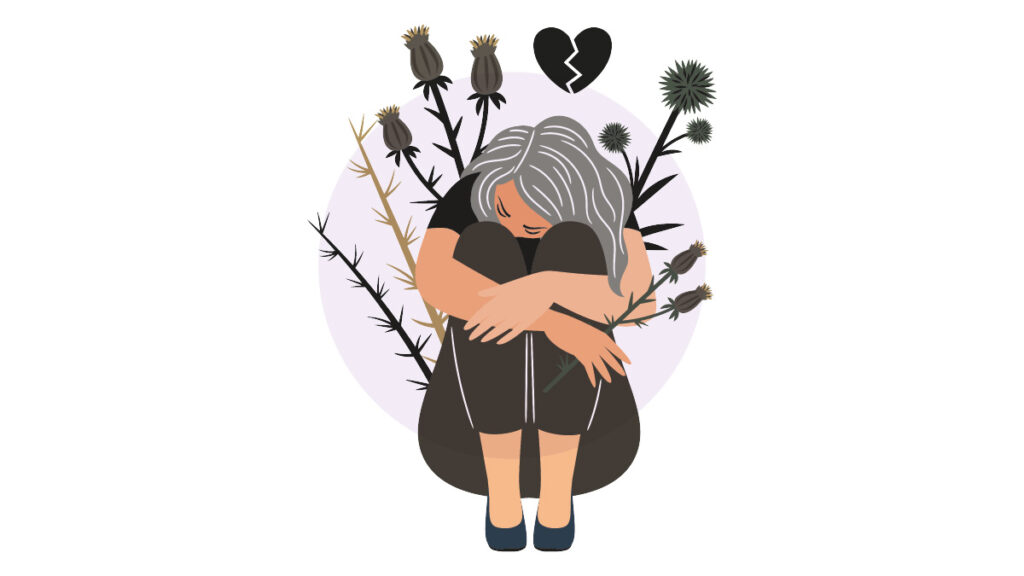Ante la pérdida, esta etapa se convierte en una montaña rusa emocional de la que puedes salir adelante
El duelo es un proceso de desorden emocional debido a una pérdida significativa, tanto de seres queridos como de las rutinas de convivencia que se interrumpen con su ausencia.
Esta etapa se compara con una montaña rusa emocional por los cambios de ánimo intermitentes que se sufren al pasar de la tristeza profunda a la rabia, o de una aparente aceptación de la voluntad de Dios a una culpa tormentosa.
Las emociones son reacciones biológicas que no deben ser calificadas como buenas ni malas. A veces, sentirse bien produce dolor en una persona que guarda luto por un ser querido.
El duelo tiene dos componentes en la pérdida
Primaria: El fallecimiento de nuestro ser querido.
Secundaria: Todos los cambios inherentes a la pérdida primaria, como todo lo que ya no haremos juntos, lo que ellos hacían por nosotros, o el tiempo que les dedicábamos. Con su ausencia, sentimos que hemos perdido el sentido de propósito y no sabemos cómo reorganizarnos.
Déjate abrazar
Es muy importante que te permitas ser abrazada cuando transites por un duelo. Déjate acompañar. Escoge con quién expresar tu dolor. Es bueno llorar, es bueno hablar de lo sucedido con la persona correcta. Elige a quien pueda escucharte sin juzgar, sin opinar ni calificar como bueno o malo ninguno de tus episodios, respetándote y sin forzarte a nada.
Cada proceso es diferente, guardar silencio, darse tiempos a solas, llorar o hablar de lo sucedido una y otra vez con libertad permite que la nueva normalidad sin tu ser querido sea procesada en tu mente.
Sólo, por favor, no te quedes en aislamiento por más de 15 días, porque la culpa vendrá cuando estés a solas. Los mil “porqués” y “si hubiera” son palabras clave que alertan sobre la culpa tocando la puerta.
Una promesa maravillosa en Job 14:7-9 dice que Dios, al corazón quebrantado, le ofrece medicina para su dolor en el agua: “Porque si el árbol fuere cortado, aún queda de él esperanza; si su raíz se secara en la tierra, al percibir el agua reverdecerá y hará copa, y no le faltarán renuevos”.
From grief to consolation
In the face of loss, this stage becomes an emotional roller coaster that you can overcome
Grief is a process of emotional turmoil due to a significant loss, both of loved ones and of the routines of living together that are interrupted by their absence.
This stage is compared to an emotional roller coaster due to the intermittent mood swings that occur when moving from deep sadness to rage, or from an apparent acceptance of God’s will to tormenting guilt.
Emotions are biological reactions that should not be classified as good or bad. Sometimes, feeling good causes pain in a person who is grieving for a loved one.
Grief has two components to loss
Primary: The death of our loved one.
Secondary: All the changes inherent to the primary loss, such as everything we will no longer do together, what they did for us, or the time we dedicated to them. With their absence, we feel like we have lost our sense of purpose, and we don’t know how to reorganize ourselves.
Let yourself be embraced
It is very important that you allow yourself to be embraced when you go through a period of mourning. Let yourself be accompanied. Choose who to express your pain with. It is good to cry; it is good to talk about what happened with the right person. Choose someone who can listen to you without judging, without giving an opinion or classifying any of your episodes as good or bad, respecting you and without forcing you to do anything.
Each process is different, keeping silent, giving yourself time alone, crying or talking about what happened repeatedly freely allows the new normal without your loved one to be processed in your mind.
Just, please, do not stay in isolation for more than 15 days, because guilt will come when you are alone. The thousand “whys” and “ifs” are key words that alert about guilt knocking on the door.
A wonderful promise in Job 14:7-9 says that God, to the broken heart, offers medicine for its pain in the water: “For though the tree be cut down, there is hope for it; though its root dries up in the earth, when it is watered it will sprout and put forth its shoots, and will not lack shoots.”

